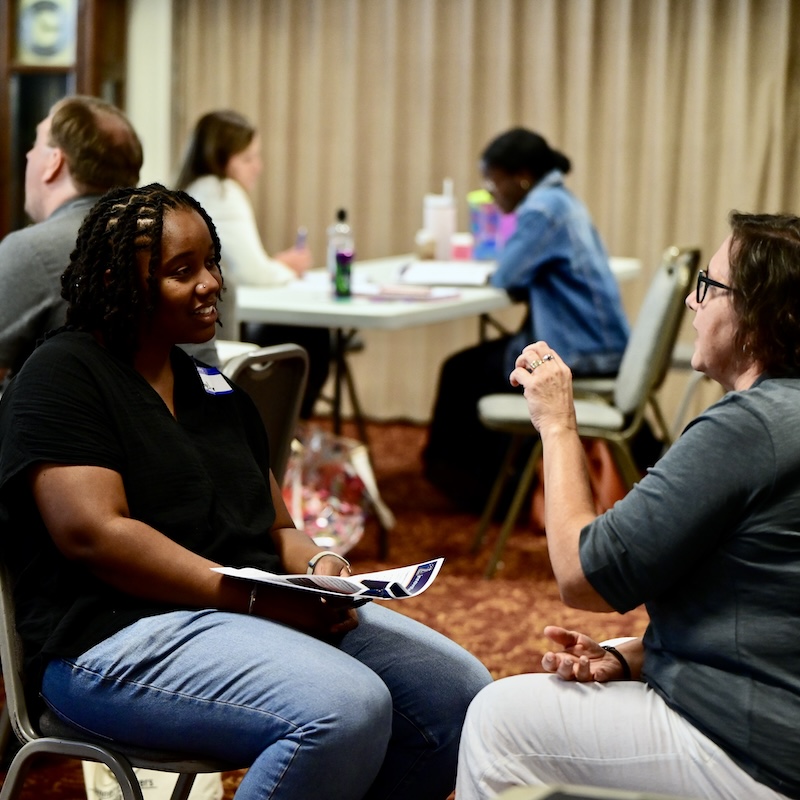No products in the cart.

by Will Penner
Approximate length: 35 minute
The story of the prodigal son is most often told from the viewpoint of the prodigal himself. Through the eyes of the prodigal, we are given a sense of God’s love and mercy. But, of course, there’s some back-story, and another important story-line than just the bad-boy returned home. There’s the good boy, the brother who did everything right. How did he feel?
This talk is an exploration of the feelings that the “good kids” often have when the “bad kids” don’t seem to get what they deserve. As children of God, we have the opportunity to be extensions of God’s grace to others; but we sometimes have difficulty getting beyond our anger, arrogance, and jealousy.
Supplies:
Openers:
The Heart of the Talk
1. Anger
• Transition by saying something like this: The word used describe the anger the brother feels is the same one used by Jonah, when he got upset with God for not destroying Ninevah.
• Scripture: Jonah 3:3-5, 10; 4:1-4 (Jonah prophesies, Ninevah repents, God relents, Jonah gets angry.)
• Discussion: Isn’t it interesting how we can get upset with God for being compassionate to those we don’t like? If you were to be really honest right now, are there people you would like to see God smite? Have you ever been so angry with someone else that the thought of God having mercy on them makes you sick? What would Jesus have to say about that?
2. Righteous Indignation
• Another place that word for anger is used in Scripture is by Jesus, as he talks about what the Kingdom of Heaven will be like.
• Scripture: Matthew 20:1-16 (Parable of the workers in the vineyard.)
• Discussion: What’s up with everyone getting paid the same, regardless of how much they work? It doesn’t seem fair, does it? Is that how we do fundraisers in our youth group? If not, is that how we should?
• Explanation: Sovereignty of God (see below)
Sovereignty of God
Whose money is it to begin with? God’s, right? So, what business do we have telling God who should receive grace and who should receive punishment? Isn’t our desire for “justice” often a misguided attempt for us to be in charge, instead of leaving that judgment up to God? Perhaps some of anger is less about “justice” and more about us trying to be in charge instead of God.
3. Exclusivity
• Transition by saying something like: There’s another danger when we’re in the role of the older brother…the tendency to compare ourselves to others in unhealthy ways.
• Discussion: “Over and Against” (see below)
• Scripture Luke 15:31-32 (Father’s explanation to the older son.)
• Explanation: “Everything I Have…” (see below)
Discussion: “Over and Against”
There’s all sorts of ways we define our selves, both individually and collectively. We define ourselves by clothing styles, favorite music, athletic talent, extracurricular interests, geography (where we live), race, sex, belief systems, etc. (If you’d like, you can have the kids come up with a list of ways we break down into different groups…even just within your own youth group, perhaps.)
Sometimes those are very productive, proactive ways to define ourselves. For instance, in some churches, people say affirmations of faith (like the Apostle’s Creed) in each worship service as a way of defining who they are by what they believe.
Sometimes we use “over and against”-ness to define who we are. Teenagers are especially good at defining who they are based on a counter response to how adults try to define them. We may seek our sense of identity through going against the flow of the norm.
We need to be careful, though, of being overly exclusive in the ways we define ourselves as a church or youth group. In our group, do we ever try to define ourselves in exclusive, rather than inclusive, terms? If so, how? (examples: theology/doctrine, denomination, cool programs & trips) Do we say or do things that exclude the “prodigals” from our group? Do we define ourselves over and against other people or groups? Or do we look for more inclusive ways to define who we are?
“Everything I Have…”
The father reaffirms his love for the older son, along with his place in the family, but he insists that this kind of love does not exclude the younger brother. Jesus is speaking to the attitude of the Pharisees and teachers of the law, who were of the mindset that God’s love was reserved exclusively for a select group of chosen Israelites who kept the commandments.
4. Jealousy
• Transition by saying something like this: And sometimes our reaction as the older brother is as simple as good old-fashioned jealousy. We all struggle with jealousy. It’s the ugly little monster in all of us that screams, “It’s not fair!” and “I deserve better!”
• Activity: Jealousy Commercials (see below)
• Scripture: Luke 15:28-30 (Older son’s whining)
• Discussion: “I’ve done everything you’ve ever asked of me, and you’ve never thrown a party for me.” Are there areas in your life when you feel that way? Do your parents ever treat your siblings differently? How about at church? Do you ever feel like more attention is given on “the lost” than on kids who follow the rules?
• Movie clip: Big (see below)
• Explanation: Here’s a guy who’d done everything he was asked to do. He did all of his homework, put together a nice presentation. Tom Hanks hasn’t done any prep work, but he’s the one who wins the admiration of the boss. Those of us who come to church regularly, pray every day, and read our Bibles may feel a little ripped off by others who seem to be able to get away with anything they want. But God calls us to be instruments of his love and forgiveness to them.
Activity: Jealousy Commercials
Divide students into groups (the size can vary depending on your group; a large group could use smaller groups of 10, a small group could use smaller groups of as few as 3). Tell each team you want them to create a 30-second commercial (which they will act out live) for “Jealousy”, which they should treat as if it were a product.
Give the groups about 5 minutes to put together their commercials. Then have them all perform them.
Movie clip: Big
Start at 00:42:53 when the meeting begins End at 00:46:04 when the man is outside mocking Tom Hanks, saying, “I don’t get it. I don’t get it.” In this clip a group of executives is looking at the next toy they want to create and distribute to their stores around the country.
Closer
• Discussion: Church Board (see below)
• Explanation: That may have seemed a bit awkward if you recognized Josh to be Jesus. But don’t we judge people like this every day? Let’s not forget that what we do to the least of our brothers and sisters, we do to Jesus (Matthew 25:40); so it may not be as far-fetched as you think.
• Discussion: Let’s look back at each of the Scriptures that correspond with Josh’s example with you on the church board. But instead of looking for the moral, and instead of looking through the eyes of the “prodigal” in the story, try looking at it from the viewpoint of the person or people Jesus is criticizing.
• Scripture: Mark 10:17-22 (The rich, young ruler)
• Scripture: John 2:13-16 (Money changers in the temple)
• Scripture: Luke 6:1-5 (Jesus’ disciples plucking grain on the Sabbath, and his reference to David eating the bread of the Presence)
• Explanation: Often we are reminded of our own personal need for God’s grace and forgiveness. None of us need look very far into our own hearts before we discover that if we always got what we deserved, we’d be in trouble. As children of God, we have the unique opportunity to be extensions of that kind of grace toward other people, as well. As we go out into the world, let us write a different storyline when we find ourselves in the role of “the other brother.”
Discussion: Church Board
You have all recently been elected to your church board. It is your job to make decisions that are in the best interests of this church. You know there are other churches out there, too, but some of them teach things that you don’t find compatible with Scripture.
You like to see people in your congregation work hard, because when they make a lot of money, they tithe more. This is good, because it helps you pay for rent, utilities, hymnals, etc. You also like seeing the youth group sell muffins in the foyer between worship services, because it helps them offset the costs for their ski trip. One thing that’s well known about your church is that everyone who’s a member takes the day off from work once a week, and they come to a worship service. At this service, they take communion; whatever bread is left over after communion, though, gets thrown away. Nobody is supposed to eat it.
This meeting has been called to order because Josh, a young man who’s not even a member of this church, has been creating problems in your church.
First of all, he told one the largest contributor that he couldn’t be a good Christian unless he sold everything he had and gave it to the poor. Now, we had been counting on that money to buy the new church organ! Secondly, he knocked over the muffin table, saying something about “Dad’s place.” Thirdly, he not only was working last week when he was supposed to take off, but then he came in and told the kids it was okay to eat the communion bread no one is supposed to eat!
Your job, then, is to figure out what to do with this troublemaker. (Encourage the kids to really try to stay in character and come up with the kind of solution(s) their church board might develop based on these scenarios.) Take a few minutes, breaking up into groups, to come up with a proposed course of action. Then we’ll gather back together and vote on one.
Student Talkback
Middle School:
• How did the older brother feel after his Father received the younger brother so warmly? Why?
• Why was Jonah’s response to God’s mercy on Ninevah?
• What did Jesus say to the money-changers in the temple?
High school:
• What did Jesus tell the rich, young ruler to do in order to enter the Kingdom of Heaven?
• Why did Jonah get angry with God?
• How did the religious leaders respond to Jesus plucking grain on the Sabbath and eating the bread of the Presence?
Life-Application Questions
• Identify which areas of your life in which you are the “prodigal” (in which you need grace and forgiveness from God).
• Identify which areas of your life in which you are the “other brother” (in which you need to extend grace and forgiveness to others).
• Who are the “other brothers” in your life (the people from whom you most often need grace and forgiveness)?
• Who are the “prodigals” in your life (the people from whom you most often need to extend grace and forgiveness)?
Going Forward
• We not only have “prodigal” and “other brother” tendencies individually, but we have them collectively, as well. In what areas is our youth group “prodigal” and in what areas are we “other brother?”
• In what areas is our church “prodigal” and in what areas are we “other brother?”
• How can we take seriously the responsibility Jesus gave his disciples (in Matthew 18:22) to forgive people over and over again?


